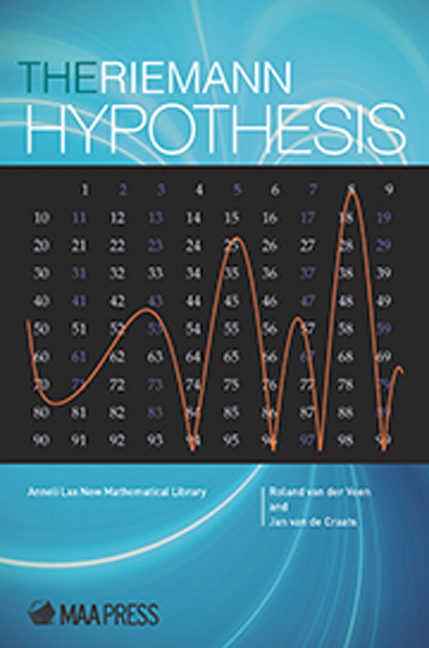Book contents
- Frontmatter
- Dedication
- Anneli Lax New Mathematical Library
- Contents
- Preface
- 1 Prime numbers
- 2 The zeta function
- 3 The Riemann hypothesis
- 4 Primes and the Riemann hypothesis
- Appendix A Why big primes are useful
- Appendix B Computer support
- Appendix C Further reading and internet surfing
- Appendix D Solutions to the exercises
- Index
Preface
- Frontmatter
- Dedication
- Anneli Lax New Mathematical Library
- Contents
- Preface
- 1 Prime numbers
- 2 The zeta function
- 3 The Riemann hypothesis
- 4 Primes and the Riemann hypothesis
- Appendix A Why big primes are useful
- Appendix B Computer support
- Appendix C Further reading and internet surfing
- Appendix D Solutions to the exercises
- Index
Summary
Mathematics is full of unsolved problems and other mysteries, but none more important and intriguing than the Riemann hypothesis. Baffling the greatest minds for more than a hundred and fifty years, the Riemann hypothesis is at the very core of mathematics. A proof of it would mean an enormous advance. In addition, the Riemann hypothesis was chosen as one of the seven Millennium Problems by the Clay Mathematics Institute. This means that proving the Riemann hypothesis will not only make you world famous, but also earns you a one million dollar prize.
The Riemann hypothesis concerns the prime numbers
2,3,5,7,11,13,17,19,23,29,31,37,41,43,47, …
i.e., the integer numbers greater than 1 that are not divisible by any smaller number (except 1). Ubiquitous and fundamental in mathematics as they are, it is important and interesting to know as much as possible about these numbers. Simple questions would be: how are the prime numbers distributed among the positive integers? How many prime numbers are there? What is the number of prime numbers of one hundred digits? Of one thousand digits? These questions were the starting point of a groundbreaking paper by Bernhard Riemann written in 1859. As an aside in his article Riemann formulated his now famous hypothesis, that so far nobody has come close to proving:
The Riemann Hypothesis.All nontrivial zeroes of the zeta function lie on the critical line.
Hidden behind this at first mysterious statement, lies a whole mathematical universe of prime numbers, infinite sequences, infinite products and complex functions. The present book is a first exploration of this fascinating world.
The Riemann hypothesis as an online course
The Riemann hypothesis was the subject of a web class, a four-week online course organized four times in the years 2006 to 2010 by the Korteweg- De Vries Institute for Mathematics at the University of Amsterdam. It was aimed at mathematically talented secondary school students. This book originated from the course material. The goal of these courses was not to solve the Riemann hypothesis, but to introduce interested and talented students to challenging university level mathematics.
- Type
- Chapter
- Information
- The Riemann Hypothesis , pp. ix - xiiPublisher: Mathematical Association of AmericaPrint publication year: 2016



